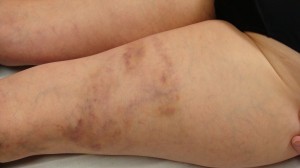When you read about acupuncture and Chinese medicine, frequently you will find a lot of discussion about the importance of Qi, or energy, and how its flow is vital to good health. Blood, however, is considered to be equally as important in this medicine, because it is responsible for nourishing and moisturizing every organ in your body. Both Qi and Blood flow together, but Qi is considered lighter and more active, and blood is more nourishing and concrete. For example, in your muscles Qi is what powers their movement, but Blood is the substance that nourishes them, gives them mass, and keeps them healthy.
Like Qi, Blood must be abundant and flow smoothly for optimal health. Therefore, imbalances related to Blood concern either depletion or lack of flow.
 Blood depletion, or deficiency, is a condition in which the ability of your Blood to nourish all of your organs is not up to par. In some ways, it’s similar to anemia in Western medicine. However, a diagnosis of blood depletion in Chinese medicine may not show up as anemia on a Western blood test, as it is more about your Blood’s ability to provide your body with nutrients, rather than the number of red blood cells, platelets, or levels of hemoglobin. Some possible symptoms of Blood depletion include a pale complexion, dizziness, insomnia, heart palpitations, scanty periods, numbness, dry flaky skin, dry eyes, and brittle nails.
Blood depletion, or deficiency, is a condition in which the ability of your Blood to nourish all of your organs is not up to par. In some ways, it’s similar to anemia in Western medicine. However, a diagnosis of blood depletion in Chinese medicine may not show up as anemia on a Western blood test, as it is more about your Blood’s ability to provide your body with nutrients, rather than the number of red blood cells, platelets, or levels of hemoglobin. Some possible symptoms of Blood depletion include a pale complexion, dizziness, insomnia, heart palpitations, scanty periods, numbness, dry flaky skin, dry eyes, and brittle nails.
Blood can become depleted for a variety of reasons, especially in instances where it’s lost, such as surgery, childbirth, heavy menstrual periods, or an injury. In addition, chronic illness, poor diet, or poor digestion can deplete your Blood, because it’s through the process of digesting nourishing foods that your body converts nutrients into Qi and Blood. If your digestive mechanism is impaired in any way, the long-term result can be depleted Blood.
A second imbalance concerning your Blood in Chinese medicine is something called Blood stagnation, or stasis. Blood stagnation is a condition where the flow of your blood is impeded in some way. For example, blood clots, bruises, and varicose veins are all considered to be Blood stagnation.
The hallmark of Blood stagnation is pain that is fixed and stabbing in nature and is associated with blue or purple discoloration. A fairly benign example of stagnant Blood is a bruise. However, Blood stagnation can also affect the organ systems on a deeper level, as is the case with a heart attack, in which Blood flow is obstructed in a life-threatening way. In the case of a heart attack, the fixed and stabbing pain is in the chest, and frequently a bluish discoloration is apparent on the sufferer’s face and lips.
A third imbalance concerning your Blood is the opposite of stagnation, or bleeding too much. Bleeding disorders can occur for a couple of reasons in Chinese medicine. Heat speeds things up and can cause your Blood to move recklessly, causing symptoms such as heavy periods or a bloody nose. Depleted Qi can also cause bleeding, because one of the jobs of Qi is to contain things in your body, including holding Blood in the vessels. When your Qi is depleted, you may notice that you bruise easily or bleed longer than other people when you cut yourself.
In Chinese medicine, there are a number of ways to treat Blood disorders. Acupuncture can be very effective for moving or nourishing Blood or to stop bleeding. In addition, there are some really good herbs and herbal formulas that can treat these Blood patterns. For nourishing your Blood, Dang Gui, a kind of Angelica, is one of the first herbs most practitioners turn to. Dang Gui is versatile, as it also moves stagnant Blood, and is frequently used for gynecological problems. Chinese food therapy is also frequently used, especially for Blood depletion problems. In general, varied and darkly colored foods tend to be most Blood-nourishing.
*It’s important to note that organ systems, such as the Spleen and Heart, and vital substances, such as Yin, Yang, and Blood are capitalized in Chinese medicine. This is because these terms refer to more than just body parts or substances. These terms are essential systems in Chinese medicine, and are capitalized in acknowledgment of that face. In contrast, the spleen, heart, or blood, in a Western context, are not capitalized.



